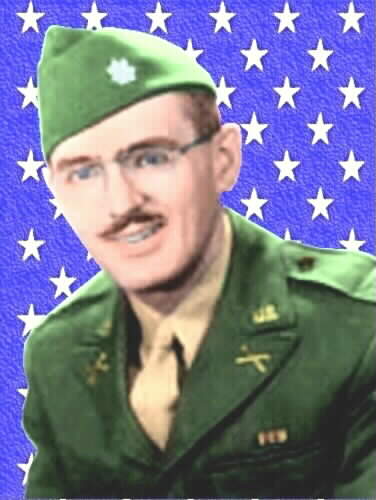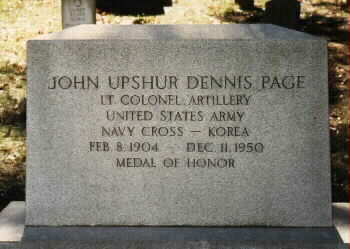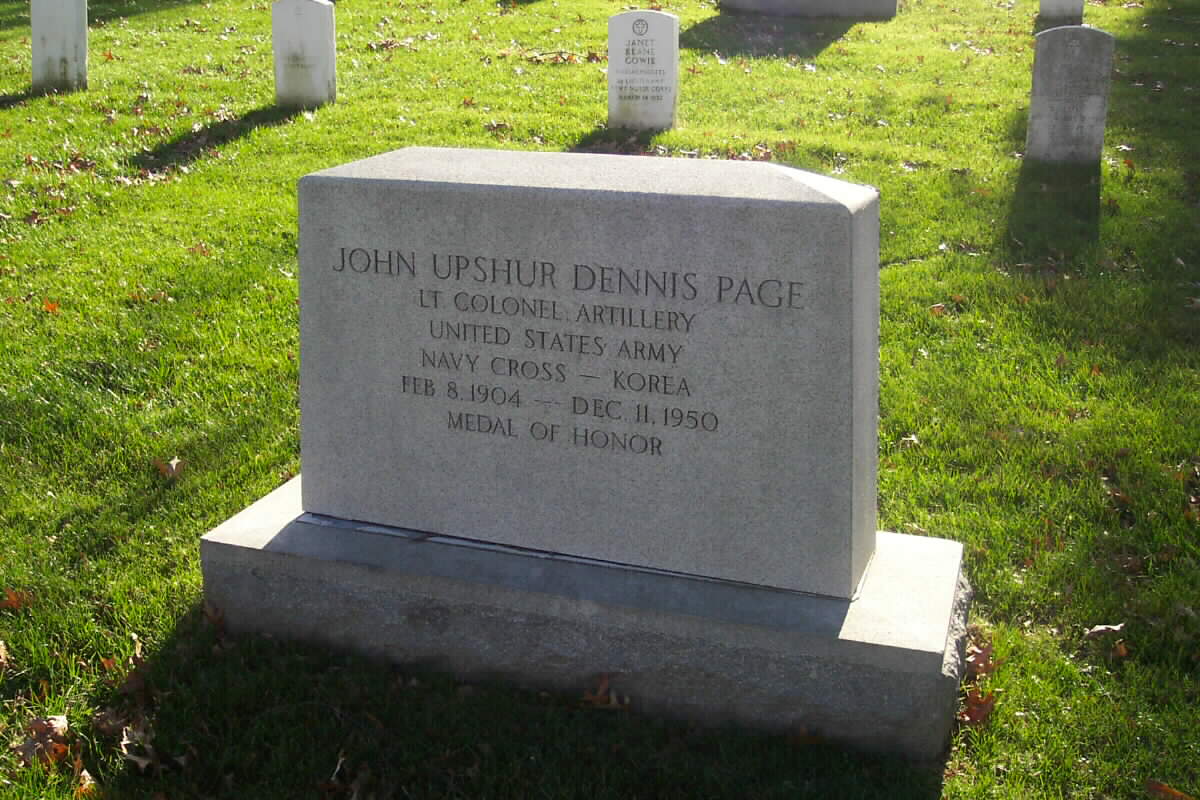He earned the Medal of Honor during the Korean Conflict while serving with the 52nd Transportation Truck Battalion, X Corps Artillery.
He was sent to the Chosin Reservoir plateau to establish traffic control of the main supply route. He found a remote signal station that needed help and quickly formed a volunteer force of assorted Army and Marine Corps personnel and brought numerous wounded to a hastily devised airstrip. There he fought off the attacking enemy with a machine gun and after ten days of combat was flown to Hamhung but did not stay in the safety of that location.
He returned to the front to help and on the night of December 10, 1950, the retreating column that he was leading was being pursued closely by the Chinese Red Army which had recently entered the conflict. They encountered heavy enemy small-arms fire. He made his way to the front of the column and plunged forward in a surprise attack, during which he was killed. For extraordinary heroism during those ten days he was posthumously awarded the Medal of Honor and the Navy Cross.
His body was eventually returned to the United States where it was buried in Section 4 of Arlington National Cemetery.
PAGE, JOHN U. D.
Rank and organization: Lieutenant Colonel, U.S. Army, X Corps Artillery, while attached to the 52d Transportation Truck Battalion. Place and date: Near Chosin Reservoir, Korea, 29 November to 10 December 1950. Entered service at: St. Paul, Minnesota. Born: 8 February 1904, Malahi Island, Luzon, Philippine Islands. G.O. No.: 21, 25 April 1957.
Citation
Lt. Col. Page, a member of X Corps Artillery, distinguished himself by conspicuous gallantry and intrepidity in action above and beyond the call of duty in a series of exploits. On 29 November, Lt. Col. Page left X Corps Headquarters at Hamhung with the mission of establishing traffic control on the main supply route to 1st Marine Division positions and those of some Army elements on the Chosin Reservoir plateau. Having completed his mission Lt. Col. Page was free to return to the safety of Hamhung but chose to remain on the plateau to aid an isolated signal station, thus being cut off with elements of the marine division. After rescuing his jeep driver by breaking up an ambush near a destroyed bridge Lt. Col. Page reached the lines of a surrounded marine garrison at Koto-ri. He then voluntarily developed and trained a reserve force of assorted army troops trapped with the marines. By exemplary leadership and tireless devotion he made an effective tactical unit available. In order that casualties might be evacuated, an airstrip was improvised on frozen ground partly outside of the Koto-ri defense perimeter which was continually under enemy attack. During 2 such attacks, Lt. Col. Page exposed himself on the airstrip to direct fire on the enemy, and twice mounted the rear deck of a tank, manning the machine gun on the turret to drive the enemy back into a no man’s land. On 3 December while being flown low over enemy lines in a light observation plane, Lt. Col. Page dropped hand grenades on Chinese positions and sprayed foxholes with automatic fire from his carbine. After 10 days of constant fighting the marine and army units in the vicinity of the Chosin Reservoir had succeeded in gathering at the edge of the plateau and Lt. Col. Page was flown to Hamhung to arrange for artillery support of the beleaguered troops attempting to break out. Again Lt. Col. Page refused an opportunity to remain in safety and returned to give every assistance to his comrades. As the column slowly moved south Lt. Col. Page joined the rear guard. When it neared the entrance to a narrow pass it came under frequent attacks on both flanks. Mounting an abandoned tank Lt. Col. Page manned the machine gun, braved heavy return fire, and covered the passing vehicles until the danger diminished. Later when another attack threatened his section of the convoy, then in the middle of the pass, Lt. Col. Page took a machine gun to the hillside and delivered effective counter fire, remaining exposed while men and vehicles passed through the ambuscade. On the night of 10 December the convoy reached the bottom of the pass but was halted by a strong enemy force at the front and on both flanks. Deadly small-arms fire poured into the column. Realizing the danger to the column as it lay motionless, Lt. Col. Page fought his way to the head of the column and plunged forward into the heart of the hostile position. His intrepid action so surprised the enemy that their ranks became disordered and suffered heavy casualties. Heedless of his safety, as he had been throughout the preceding 10 days, Lt. Col. Page remained forward, fiercely engaging the enemy single-handed until mortally wounded. By his valiant and aggressive spirit Lt. Col. Page enabled friendly forces to stand off the enemy. His outstanding courage, unswerving devotion to duty, and supreme self-sacrifice reflect great credit upon Lt. Col. Page and are in the highest tradition of the military service.
John Upshur Dennis Page
St. Paul, Minnesota – Born February 8, 1904
Lieutenant Colonel, US Army
Killed in Action December 11, 1950 in Korea
Lieutenant Colonel Page a veteran of World War II. In Korea, he was a member of Headquarters, X Corps attached to the 52nd Transportation Battalion. When a superior enemy force attacked a Marine convoy near Sudong-ni, North Korea, he repeatedly exposed himself to enemy fire to organize the convoy personnel and single-handedly fought the enemy to protect wounded comrades until he was mortally wounded. For his leadership and great valor, Lieutenant Colonel Page was awarded the Medal of Honor and the Purple Heart.
MEDAL OF HONOR GIVEN
Lieutenant Colonel Killed in Korea Cited by Army
WASHINGTON, December 19, 1956 – The Army announced today the award of the Medal of Honor to Lieutenant Colonel John U. D. Page. He was killed while covering the withdrawal of American troops from North Korea in December 1950. His widow lives in St. Paul, Minnesota.
Colonel Page is the seventy-eighth Army man to receive the nation’s highest award for heroism for fighting in the Korean War.
He received the posthumous award for his “supreme self-sacrifice” over a twelve-day period during which he accepted one perilous assignment after another to rescue American forces trapped near the Yalu River by the onslaught of Chinese communist forces.
Colonel Page was killed near Sudong-ni while single-handedly fighting the enemy so that American forces might withdraw. He was part of a Marine-Army convoy that was retreating from the area of Chosin Reservoir.
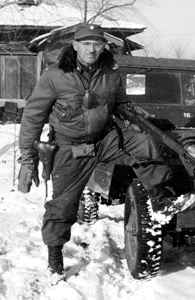
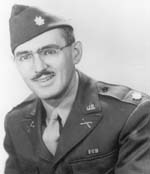
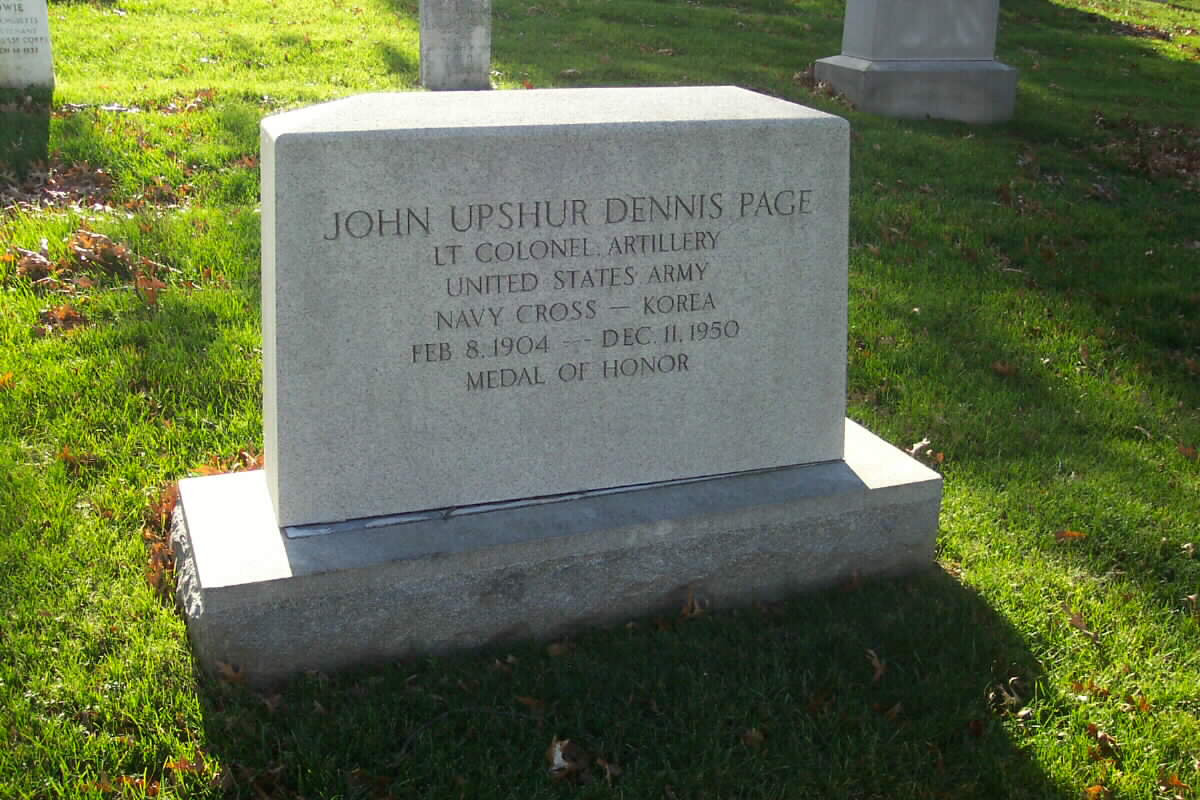
Michael Robert Patterson was born in Arlington and is the son of a former officer of the US Army. So it was no wonder that sooner or later his interests drew him to American history and especially to American military history. Many of his articles can be found on renowned portals like the New York Times, Washingtonpost or Wikipedia.
Reviewed by: Michael Howard

